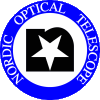
Johannes Andersen Student Programme at the Nordic Optical Telescope
GeneralThe Nordic Optical Telescope (NOT) is a modern 2.6-m telescope operated at the Observatorio del Roque de los Muchachos on the island of La Palma in the Canaries, Spain. NOT is the main northern-hemisphere telescope facility for Nordic astronomy and offers excellent image quality, state-of-the-art detectors and instruments, and an informal, friendly working environment. As such, it offers unique hands-on training opportunities in modern observational astronomy for Nordic astronomy and engineering students. A full range of information on the facilities, staff, and environment at NOT is maintained at the NOT WWW site.The NOT Research Studentship programme enables students to spend extended periods at the NOT and take advantage of these opportunities. NOT students receive a monthly stipend to cover their living expenses on La Palma and may rent a room at a favourable rate in of two NOT apartments located in Santa Cruz de La Palma. Students are free to pursue their thesis work during 70% of the time and are expected, in return for the financial support, to spend the remaining 30% on doing hands-on service observations, introducing and assisting visiting astronomers in the use of the telescope and instruments, doing tests, writing software, or similar tasks. Student projects, at the Ph.D. or M.Sc. level, may be in any field of observational astronomy, involving optical and near-infrared observations with the NOT, or they may concern related developments in optics, detectors and electronics, or in instrument control and data reduction software. Both astronomy and engineering students are supported under the programme. During the first three months of a studentship, our students are trained to use the telescope and the most-used instruments (ALFOSC, FIES). Here the focus lies on NOT instruments/detectors and on the data received with NOT instrumentation. The students also have the possibility to go and visit the Isaac Newton Telescope (INT) to see how observations are made with another telescope with different instruments. The NOT staff on La Palma comprises 11 staff persons; astronomers, software and hardware engineers, technicians, and administrative staff with a versatile range of skills and an informal, family-style working environment. We aim to operate with 7 trained students. Most staff members divide their working time between the telescope site at the mountaintop and the San Antonio Office (SAO), close to the main town of Santa Cruz, one hour's drive from the observatory. The NOT offices have modern computing, data reduction, and communication facilities and access to meeting rooms etc. The headquarters of the Telescopio Nazionale Galileo are located adjacent to the NOT office, and are connected to a common coffee room. Joint seminars on scientific or technical subjects are organised by the different ORM user institutions.
Eligibility, conditions, and application proceduresQualificationsNOT Research Students should normally fulfil the following requirements:
ConditionsThe conditions for employment as a NOT Research Student are as follows:
How to applyApplications are invited from time to time, typically half a year before positions become vacant.The current deadline is Monday, September 15, 2025 for starting studentships around end of 2025 or from early 2026 and onwards. Applications received before the deadline are considered on a priority basis, but inquiries are received at any time. No specific application form is needed, but applications should specify:
Applications should be sent by e-mail to the address below. Any queries about the studentships may be directed to the same address.
E-mail: directorate@not.iac.es A small committee at the NOT will assess the applications and inform the applicants of the decisions, in as short a timescale as feasible. The ownership of the Nordic Optical Telescope is shared between the University of Turku and Aarhus University. It is operated jointly by Aarhus University, the University of Turku and the University of Oslo, representing Denmark, Finland and Norway, the University of Iceland and Stockholm University.
|
||
|
